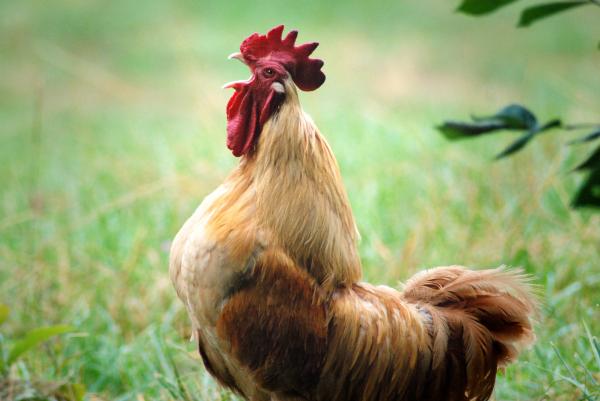“Is there a way to limit a young rooster from crowing or is there anything that you can do to “condition or train” him from excessive crowing. He doesn’t bother me, but I live on the edge of a camp and I get some mild complaints from volunteers who sleep in nearby cabins about his night crowing. I don’t want to get rid of him and I would even spend a little money to limit or eliminate his crowing if it wouldn’t harm his health. Let me know” ~ Harris
We haven’t addressed noisy roosters in quite some time so I’m glad you wrote as this is a common question.
Roosters crow – a lot.
This is not news to those of you who have roosters but if you’re new to keeping chickens, you may be under the impression that roosters only crow at day break. Crowing to announce the coming day is only one of the times a rooster instinctively crows.
It seems that a rooster crows whenever he feels the need.
Sometimes he will announce his presence to other roosters, even up to a mile away.
It’s a territorial thing. Sometimes he is calling to his ladies when he’s feeling amorous or to warn them of a predator in the area. He’ll even let them know when food is available. It seems that roosters will also crow out of boredom.
The question comes across my desk often if there are roosters that do not crow or that are bred to crow less.
The short answer to that is, “No.”
There are no breeds that crow less than others. Within a breed, you may find an individual bird that is less inclined to crow but there is no way of knowing if you’ll get a rooster that is more quiet than another.
So the question becomes, what do we do about a noisy rooster?
Although a rooster will crow at any time, he is less likely to crow when it is dark. And isn’t that the time when neighbors are most easily upset? We may enjoy the early morning ‘song’ because we appreciate our chickens. Our neighbors, who have not chosen to keep chickens, will not find it endearing.
For the sake of the neighborhood, there are a few steps we can take to tame the urge to crow.
Create a “blackout” effect in the coop.
Make sure your coop is sealed of any cracks that would allow light to come inside. Cover windows in a way that keeps out the light and keep him closed inside until you decide it is time to come out in the morning.
This will trick your roosters into believing it is still night and discourage them from sounding their early morning alarm.
Another benefit of this plan is that if your rooster is confined, even if he’s crowing, it should not be such a disturbance to your neighbors.
If you use artificial light during the shorter days of fall and winter, keep your flock up later at night. Put the light on a timer and keep them awake inside the coop. It’s almost like resetting their clocks. This coupled with the technique above can be very affective.
Another option would be to place your rooster in a low cage for the night.
Have you ever noticed that when he crows, a rooster stretches out his whole body, especially his neck? If he can not stretch due to space constraints, he will have a hard time crowing. Depending on the breed and therefore his size, select a cage that will allow him to comfortably stand to sleep but will not give him extra space to stretch out.
As for daytime crowing, see if you can determine what all the fuss is about.
If he doesn’t have enough ladies to keep him busy, add some hens to your flock. Although for you Harris, I don’t think this is a problem as you have plenty of hens.
Are there a lot of predators in the area? He could just be warning the hens and this is a good thing, not something we want to discourage.
Is he bored?
If your flock is confined to a run or a small yard, make sure there are plenty of interesting things to do. Create nooks and crannies for them to explore.
Make tunnels out of straw bales.
Hang old CDs to entertain as the sun reflects upon them (be sure to keep these well out of pecking reach).
A corn cob can keep a chicken busy for a long time.
Consider burying scraps of food under straw for them to find.
A basket with holes in it, hung just above their reach, full of lettuce scraps can be quite entertaining.
Use your imagination.
As for a medical solution, there are none that I can recommend. Clipping the vocal cords is often only a temporary solution as many roosters will learn how to crow again, despite the procedure.
Caponizing is often thought to cure crowing but that is a fallacy, caponizing will only cause the rooster to grow faster in preparation for the dinner table.
It is illegal in many countries.
At one time a hormone called DES was used to keep roosters from crowing, it produced bad side effects and is illegal in many places.
So Harris, I hope this has been of help to you.
Before you try any of these things, may I suggest you visit the volunteers and offer them some fresh eggs along with the plans you have to help deter your roosters. This is often enough to create harmony in the neighborhood.
Then if your rooster is still crowing after your efforts to stop him, the neighbors will be more understanding and less likely to complain.


